|
|
|
Sort Order |
|
|
|
Items / Page
|
|
|
|
|
|
|
| Srl | Item |
| 1 |
ID:
171985
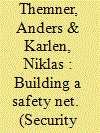

|
|
|
|
|
| Summary/Abstract |
The disarmament, demobilization, and reintegration of ex-combatants has become an integral part of peacebuilding. Although the main purpose of such interventions is to dissolve the military structures of armed groups, there is growing evidence that ex-combatant networks often remain intact. We investigate why such structures continue to thrive. We argue that ex-military networks are stronger when ex-commanders have weak links to elite patronage systems. Ex-combatants who are unable to rely on their former superiors for economic assistance must instead build denser ties to each other to gain access to a social safety net. To assess our argument, we conduct a comparative social network analysis (SNA) of two ex-military networks in Liberia. This innovative approach helps us uncover previously overlooked, but central, dynamics related to ex-combatant groups. We thereby show that SNA provides a range of underutilized tools and exact definitions that can increase our understanding of ex-military networks.
|
|
|
|
|
|
|
|
|
|
|
|
|
|
|
|
| 2 |
ID:
171219
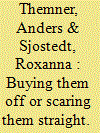

|
|
|
|
|
| Summary/Abstract |
Post–civil war democracies are characterized by intense electoral competition. To ensure continued political relevance, ex-military-turned-politicians, or “warlord democrats” (WDs), can either engage in a rhetoric of fear or ease societal tensions by employing a rhetoric of peace. WDs’ choice of rhetoric can have a profound impact on durable peace by altering societal discourses concerning the legitimacy of using violence. A key question is therefore: Why do some WDs employ a rhetoric of fear, and others a rhetoric of peace, when running for office? We argue that the choice of rhetoric is a function of the patrimonial endowments WDs possess; if WDs lack the resources and social networks needed to distribute patronage, they may instead use a rhetoric of fear to rally voters. To highlight the explanatory value of this proposition, we compare two Liberian WDs who ran for the Senate in 2005—Adolphus Dolo and Prince Johnson.
|
|
|
|
|
|
|
|
|
|
|
|
|
|
|
|
| 3 |
ID:
147528
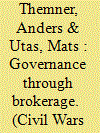

|
|
|
|
|
| Summary/Abstract |
There is currently a lack of knowledge about how elites rule post-civil war societies without strong state institutions. This paper argues that elites oftentimes overcome such institutional deficiencies by engaging in governance through brokerage. According to this perspective, elites outsource central state functions to influential broker figures. This is particularly true when dealing with war-affected groups that possess much violent agency. By functioning as social membranes, brokers can help elites and war-affected groups to redefine a new social contract. Liberia is employed as an example to illustrate the paper’s central arguments.
|
|
|
|
|
|
|
|
|
|
|
|
|
|
|
|
| 4 |
ID:
121407
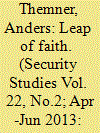

|
|
|
|
|
| Publication |
2013.
|
| Summary/Abstract |
Previous research has given scant attention to the issue of how and when ex-combatants resort to organized violence. This article fills this research gap by comparing ex-fighters in the Republic of Congo and Sierra Leone. It holds that ex-combatant violence is the result of interaction between entrepreneurs of violence, military affinities, intermediaries, and selective incentives. Ex-combatants take to arms when they have access to entrepreneurs of violence. By offering selective incentives and utilizing existing military affinities, entrepreneurs can generate the enticements and trust needed to convince ex-combatants to resort to arms. However, as entrepreneurs have limited contact with ex-fighters, they are dependent on intermediaries to do the actual recruiting for them. Contrary to previous assumptions, this article finds that ex-fighters are largely risk-averse individuals and that ex-combatant violence is seldom triggered by the mere presence of small arms, lack of economic opportunities, or experiences of insecurity.
|
|
|
|
|
|
|
|
|
|
|
|
|
|
|
|
| 5 |
ID:
184461
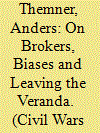

|
|
|
|
|
| Summary/Abstract |
In this paper I critically discuss the pros and cons of working with research brokers from a political science perspective. I do this by sharing my experiences of collaborating with two types of local “fixers” – cultural and communal brokers. I argue that even if similar approaches risk introducing a number of broker-induced biases, countermeasures can be taken to mitigate their effect: e.g. continuous triangulation, interviewing “sleepers” and asking in-depth questions to exclude interviewees who misrepresent themselves. However, researchers must be aware that working with multiple brokers can also generate methodological and ethical challenges that need to be taken into consideration.
|
|
|
|
|
|
|
|
|
|
|
|
|
|
|
|
|
|
|
|
|